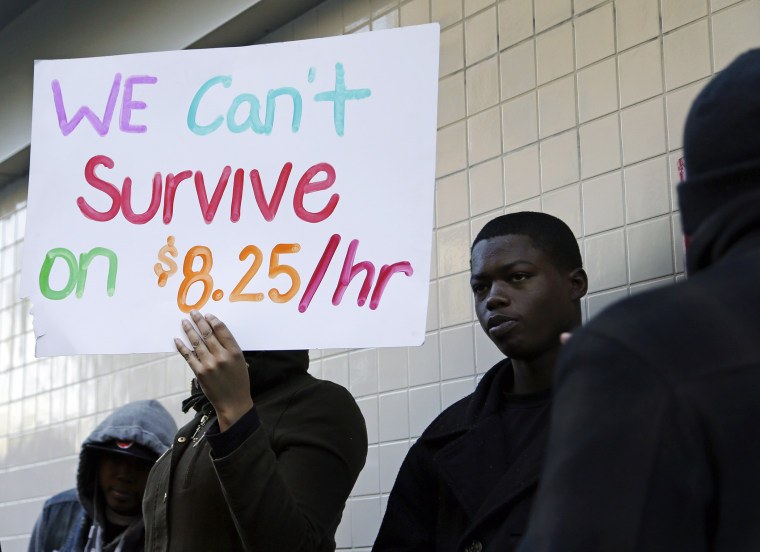Raising the federal minimum wage should, in theory, be fairly easy. The policy enjoys overwhelming public support; economists have told policymakers an increase would give the economy a boost; and President Obama has made this a top policy priority.
But legislative efforts are stuck: congressional Republicans, many of whom are on record wanting to lower the minimum wage to zero, remain fiercely opposed to the measure and there's no reason to think they'll budge anytime soon.
The White House obviously can't change federal law without Congress, but Obama has figured out how to give a whole lot of workers a raise -- whether Republicans like it or not.
The president will raise the minimum wage for federal contractors to $10.10, NBC News has learned. He will announce the executive order during Tuesday's State of the Union address. This means that construction workers, the people who wash dishes on military bases, and janitors making less than $10.10 will see a wage hike.
To be sure, Obama still wants Congress to act and would sign a minimum-wage increase if it passes, but the president also has the ability to issue an executive order for federal contract workers.
This is an idea that progressive wonks and labor advocates have been talking up for a long while: the federal government applies all kinds of conditions to private companies that do contracting work. Obama is going to apply a new condition: if you want a government contract, you must pay your workers no less than $10.10 an hour.
This is a very big deal.
Because government contracts can be lucrative, and so many private enterprises want federal work, Obama can, with a stroke of a pen, give a raise to a whole lot of low-wage employees. An exact number is unavailable, but according to one report, "A survey by the National Employment Law Project of contractors who manufacture military uniforms, provide food and janitorial services, and truck goods found that 75 percent of them earn less than $10 per hour. One in five was dependent on Medicaid for health care, and 14 percent used food stamps."
The shift also sends a message to the private sector that to compete in the labor force, businesses should follow suit.
Note, the wage standards will only apply to new contracts -- the administration can't change the terms of contracts that have already been signed -- but it nevertheless sets a new floor going forward. And since contracts get renegotiated in time, eventually the policy will apply to every employer that does businesses with Washington.
There's been quite a bit of talk in recent weeks about just how much Obama can even try to get done without legislation from a do-nothing Congress, and there's been ample skepticism about the White House's "year of action" rhetoric -- executive actions and regulatory authority matter, but the most meaningful policy changes require legislation, and at least for now, congressional Republicans don't appear interested in governing.
But this presidential move on wages, hinted at for weeks, is about as significant an economic move as Obama can make on his own. Even if the State of the Union includes nothing else in the way of new policy, this alone will make tonight's address a pretty big deal.
For their part, Republicans will balk, not only at the wage policy, but at the president using an executive order to give so many Americans a raise. It's worth emphasizing, then, that (a) this course is 100% legal because the White House already has this authority under the very federal laws Congress already approved; and (b) working people won't much care whether the change came from one end of Pennsylvania Avenue or the other.
This is a popular policy, which GOP lawmakers will struggle to condemn persuasively.
